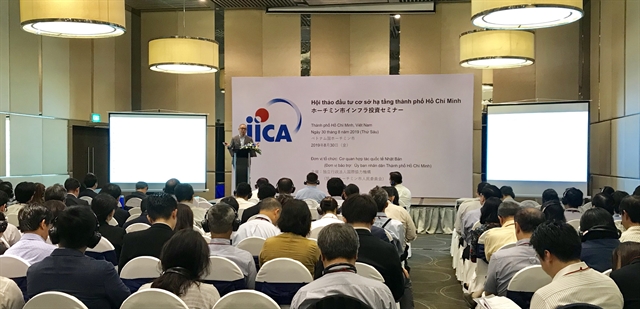 Economy
Economy


|
| A JICA representative speaks at a seminar on public-private investment in infrastructure and public services held in HCM City yesterday. VNS Photo Bồ Xuân Hiệp |
HCM CITY — HCM City authorities are seeking more public-private partnerships (PPP) to ensure socio-economic development for which they otherwise lack funds.
The city needs VNĐ326 trillion (US$14 billion) for 2016-20, but can only raise 52 per cent of the amount, meaning authorities need to seek non-public sources, according to its Department of Planning and Investment.
However, despite their great efforts to attract PPP investment, the actual mobilisation remains far below the requirement.
Speaking at a seminar yesterday, Trần Anh Tuấn, deputy director of the department, said to maintain its economic competitiveness, the city would require further investment in infrastructure, especially in areas like transport, health, education, and the environment.
Like other major cities around the world, depending solely on public investment could not meet its huge infrastructure and service development needs, he said.
Investment in PPP mode required competitiveness and transparency, and projects should benefit both the city and the private investors, he said.
PPP projects would need to be market-based, competitive, fair and transparent, and investors must be able to earn profits, he added.
According to the department, since 2000 the city has signed contracts worth nearly VNĐ70 trillion ($3 billion) for 22 PPP projects, including 16 in the transport sector and three in infrastructure. It has plans for another 130 worth nearly VNĐ381 trillion.
According to official figures, PPP projects only account for 5 per cent of the city’s total investment so far.
Recommendations
Experts say it is important to improve the legal framework for PPP investment in the city and offer incentives to investors. It is important to develop a list of projects seeking PPP and make use of revenues from state-owned properties.
The department has said it plans to mobilise properties for PPP projects and draw up plans for more projects in the near future. The city has expropriated lands based on its land-use master plan to auction them or invite tenders for projects that require land.
As of last year the city’s revenues from selling State-owned buildings and transferring land-use rights were worth VNĐ21.615 trillion ($930 million), according to the department.
The seminar, organised by the Japan International Cooperation Agency (JICA), discussed public-private investment in infrastructure, transportation, environment, healthcare, and education.
Hashimoto Hidenori of JICA’s Việt Nam office, introduced a financing facility called “Private Sector Investment Finance” as an alternative financing tool to JICA’s traditional ODA financing to support infrastructure development.
In Việt Nam, several projects have been supported by this facility together with the Asian Development Bank, including a private vocational training school by Esuhai in HCMC, a lease-type industrial complex in Nhơn Trạch III Industrial Park in Đồng Nai Province and enhancement of a coffee value chain to support smallholder farmers and farm management by Olam, according to JICA.
Officials from the Department of Natural Resources and Environment, Nguyễn Tri Phương Hospital and Phạm Ngọc Thạch Medical University Hospital also shared their infrastructure development plans and solicited investment.
HCM City is an emerging economic powerhouse in Southeast Asia and among the country’s most attractive destinations for foreign direct investment, according to experts. — VNS




